This post may contain affiliate links. Please read our disclosure policy.
These stuffed grape leaves feature a delicious blend of rice, fresh herbs, lemon, and toasted pine nuts, all wrapped in tender grape leaves. They can be served as a tasty appetizer, a delicious side dish, or a vegetarian main course, each bite offering a taste of the Mediterranean.
Being from Macedonia, stuffed grape leaves, stuffed peppers, and stuffed cabbage rolls were always on the menu. Sarmi, more commonly known as dolmas, hold a special place in my heart, transporting me straight back to our Macedonian kitchen and those fantastic mezze plates.
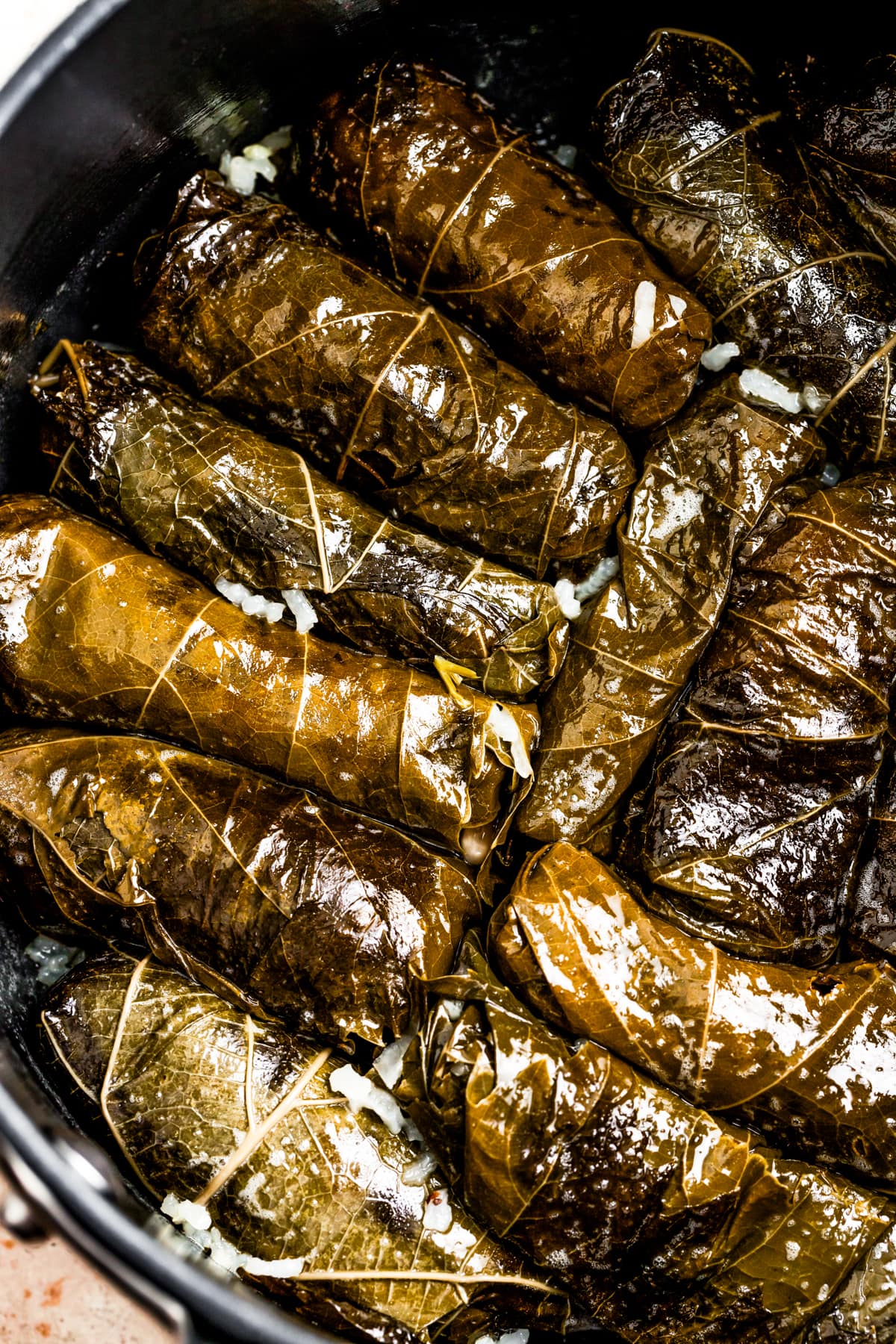
I was probably in my teens when I first tried making these savory rolls under the watchful eye of my Baba (grandmother). In our family, preparing sarmi, aka stuffed grape leaves, was a cherished ritual. The women of the house would get together to help make sarmi for an upcoming name day, wedding day, or any other celebratory event. They’d gather around the room, wrapping rice in tender grape leaves, and I’d sit there and watch. And eat.
Stuffed grape leaves are loaded with tender rice, fresh herbs, and the perfect pop of lemon flavor. I love the slight crunch from the toasted nuts and the way the olive oil-drenched grape leaves dissolve on your palate.
Light yet full of flavors, they are the perfect finger food for dinner or a grab-and-go lunch. Don’t let these tender little morsels intimidate you. They take attention to detail and tender loving care, but this recipe is relatively straightforward and well worth the effort.
What Are Stuffed Grape Leaves?
Stuffed grape leaves are a delicious appetizer, side dish, or entree found throughout many Mediterranean countries and the Middle East. Often called dolmas, warak enab, or dolmades, they are particularly popular in Turkey, Egypt, Greece, Iran, Lebanon, Macedonia, Syria, Armenia, and Israel, to name a few. They are prepared with hydrated grape leaves wrapped around rice filling, herbs and spices, and some lemon juice. Some people may add pine nuts, walnuts, ground beef, lamb, or pork to the filling.
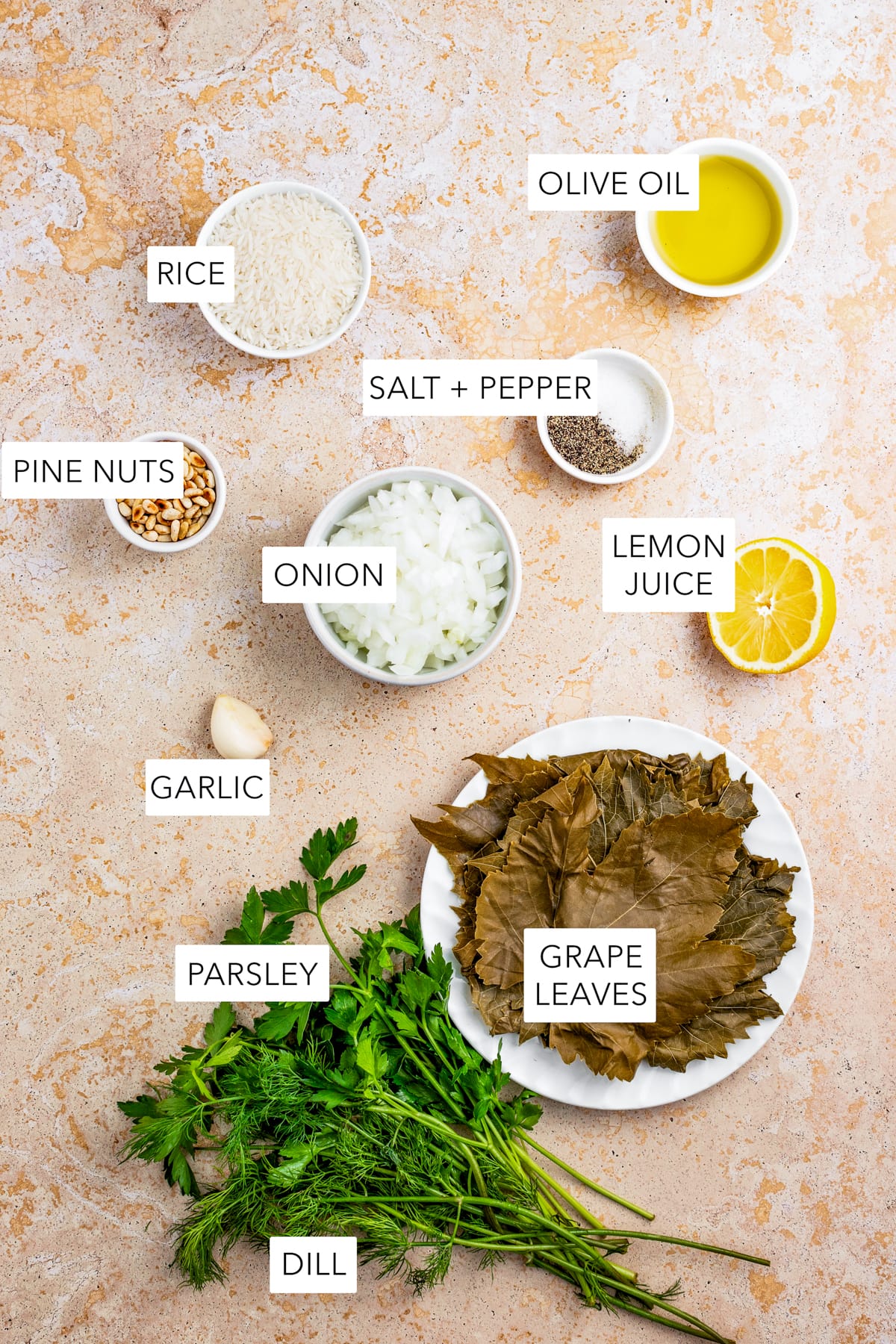
Ingredients You’ll Need
This dish is a labor of love, but the result is one of our favorite recipes. You’ll start with a jar of grape leaves and uncooked rice, which are the main ingredients to creating the best stuffed grape leaves recipe.
- Long grain rice – Jasmine, basmati, or white rice are all good options.
- Grape leaves – Jar of grape leaves are more widely available in grocery stores and are easier to use, but you are more than welcome to use fresh grape leaves. Just soak the fresh leaves in piping hot water for 15 minutes, drain them, and pat them dry before using. If you cannot find jarred grape leaves at your local grocery store, grab these Orlando California Grapes Leaves or these Krinos Imported Grape Leaves from Amazon.
- Olive oil – Grab a high-quality extra virgin olive oil here. It makes a difference.
- Onions – I use a small diced yellow onion to add some depth to the filling.
- Fresh Garlic – About 1/2 teaspoon of garlic powder can also be used, but fresh is preferred.
- Lemon juice – I highly recommend using freshly squeezed lemon juice instead of bottled.
- Fresh dill and fresh parsley – These herbs brighten the flavor and add an anise-like taste that complements the garlic and lemon.
- Toasted pine nuts – I love the crunchy texture and buttery, nutty flavor the nuts add to the stuffed leaves. Chopped walnuts are also great!
- Salt and Black pepper
How to Make Stuffed Grape Leaves
Tie your apron tight and get ready for a kitchen adventure. Making grape leaves stuffed with rice is a process, but I know you can do it. Follow my instructions closely, look at the “Tips for Success” section below, and you’ll be on your way.
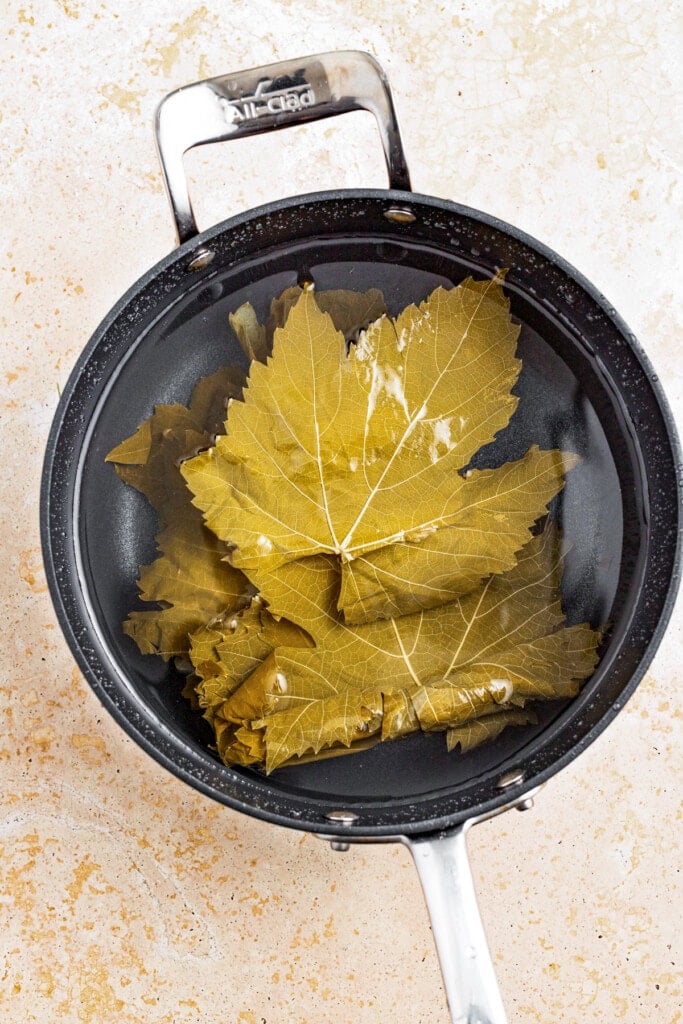
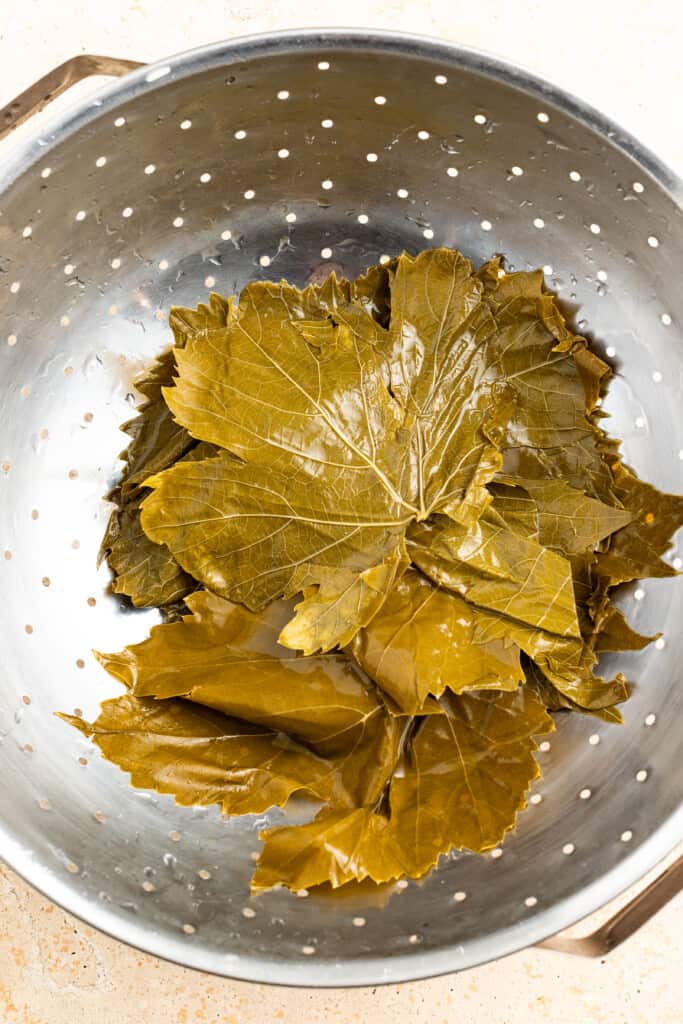
Step 1: Prepare The Rice and Grape Leaves
- Soak the rice in warm water for 20 minutes and drain it.
- Rinse the grape leaves in a colander with cold water.
- Cook the rinsed leaves in boiling water for 3 minutes or until softened.
- Drain the leaves and allow them to cool.
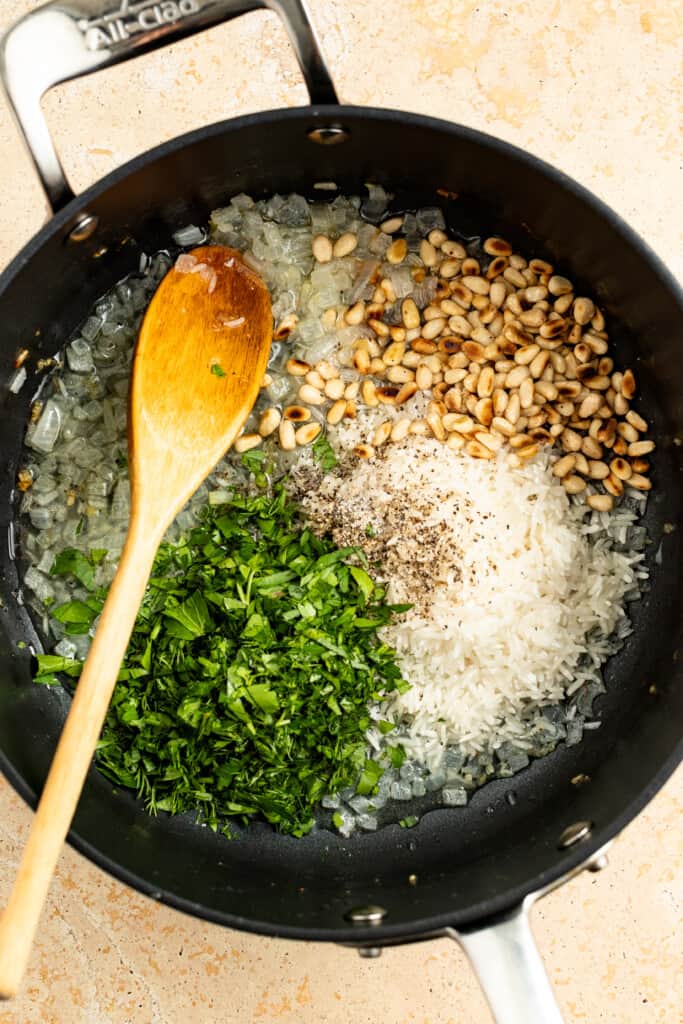
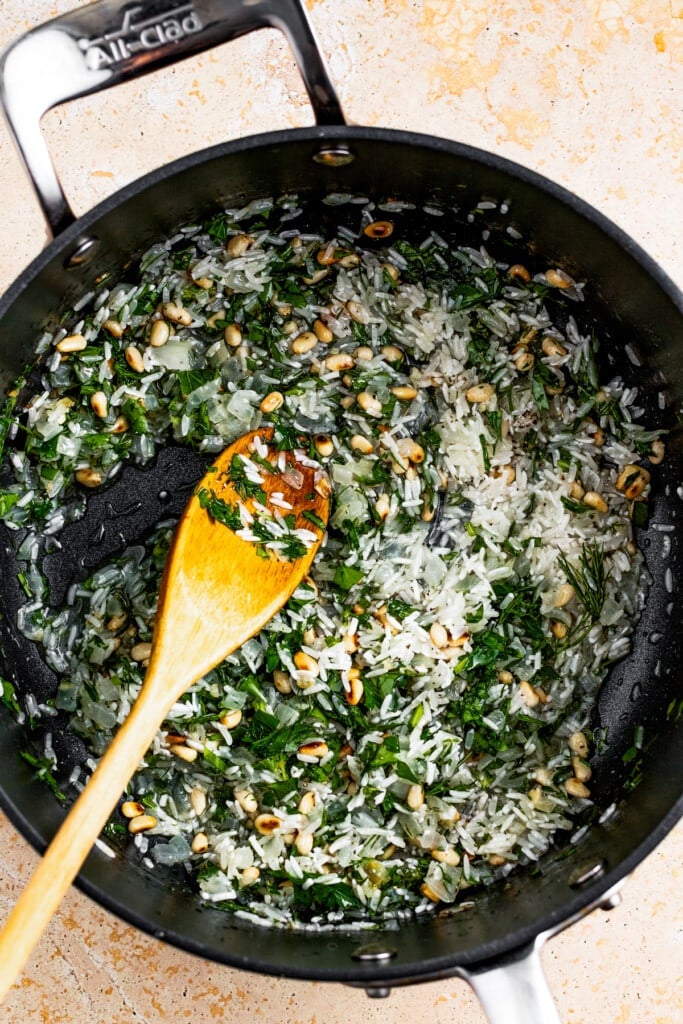
Step 2: Make The Filling
- Cook the veggies. In a large saucepan, heat 1 tablespoon of olive oil over medium-high heat. Add the onions and sauté until translucent. Add the garlic and sauté until fragrant.
- Put it all together. Remove the pan from the heat and add the rice, lemon juices, 2 tablespoons of olive oil, fresh dill, fresh parsley, toasted pine nuts, sea salt, and ground black pepper. Stir to combine.
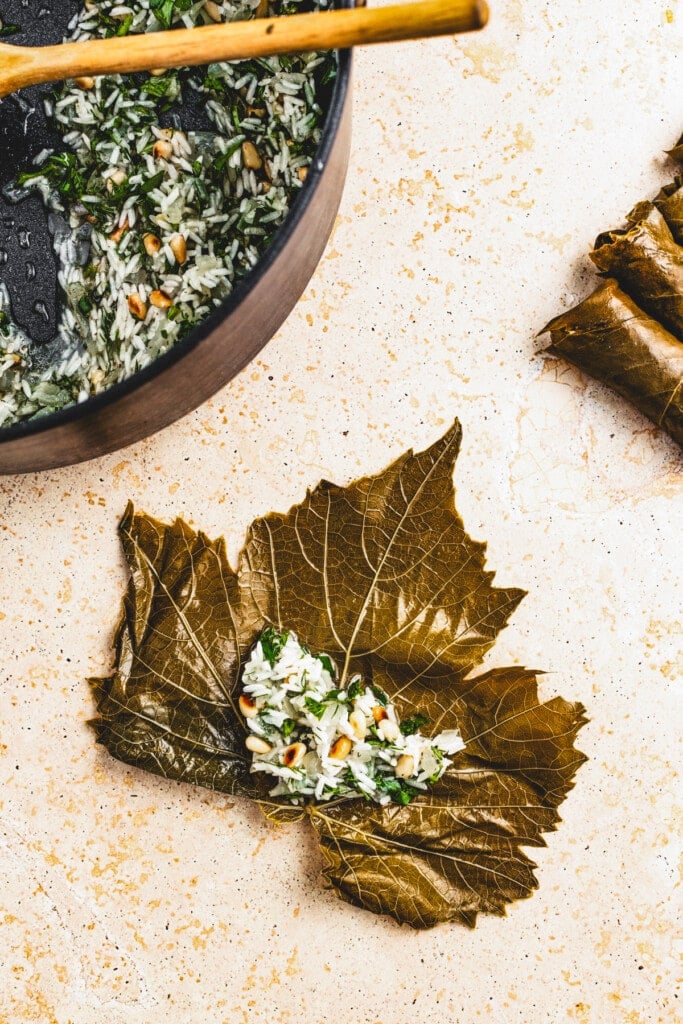
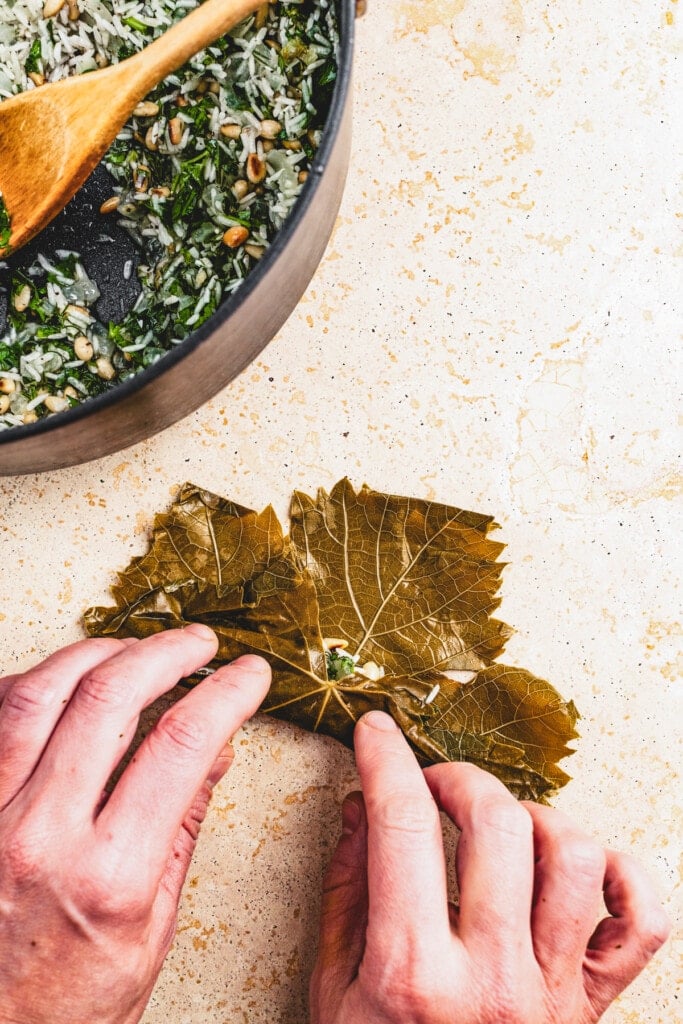
Step 3: Stuff the Grape Leaves
- Add the filling. Place an opened-up grape leaf on a flat surface. Place 2 tablespoons of the rice mixture at the stem side of the leaf, ½ inch from the edge. Roll the stem side of the leaf over the filling.
- Seal. Pull the sides toward the center. Roll from the stem side over the folded sides and the filling. Keep rolling until sealed.
- Repeat with the remaining ingredients.
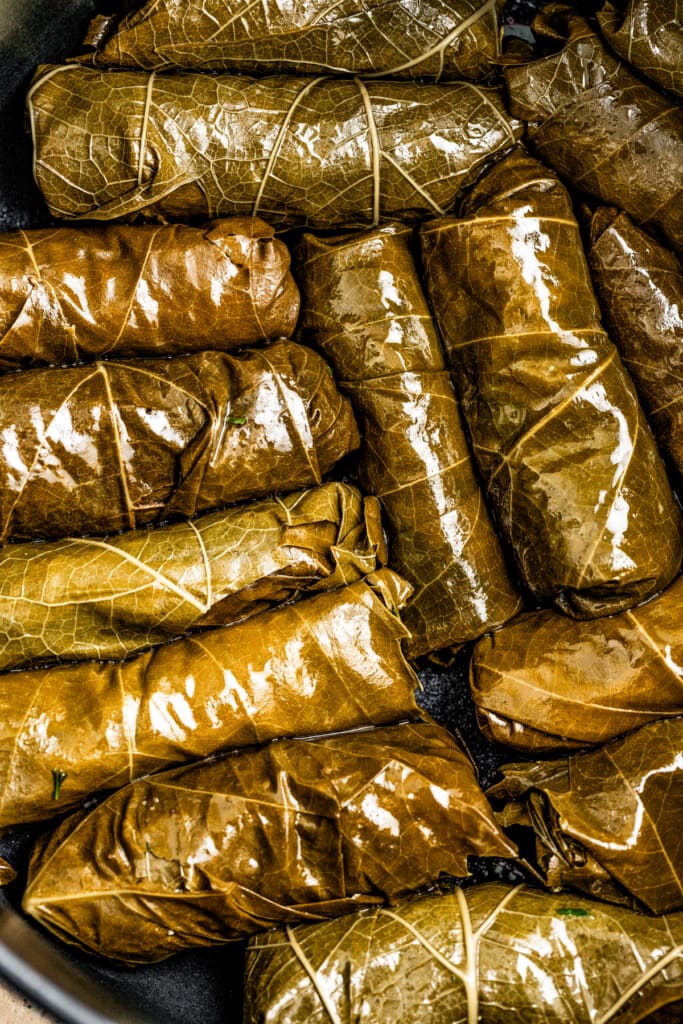
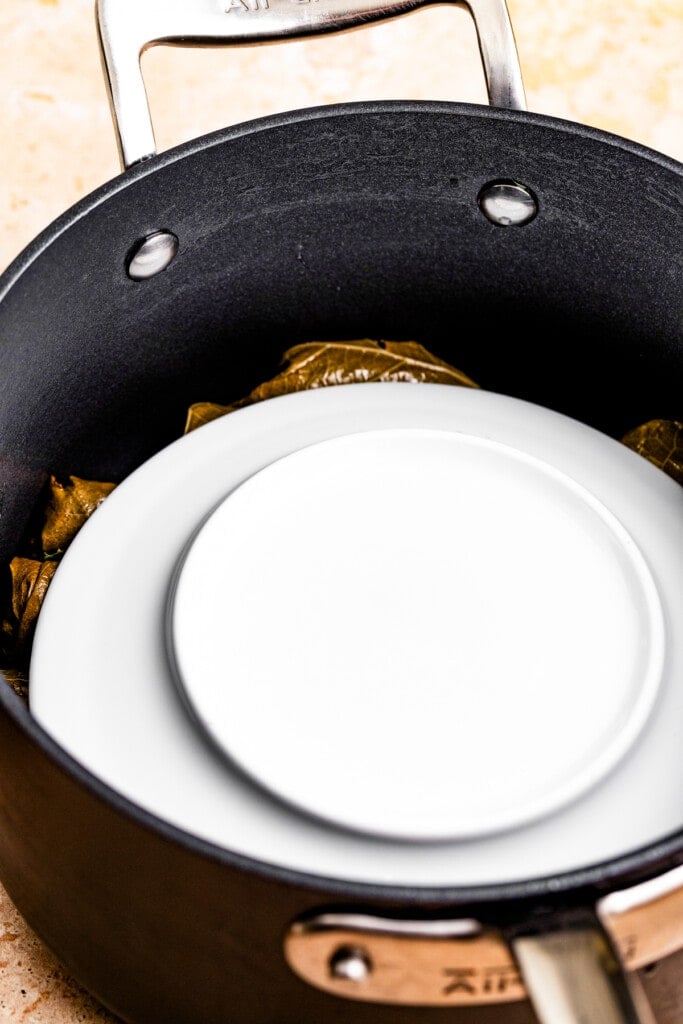
Step 4: Cook The Stuffed Grape Leaves
- Fill the pot. Arrange the stuffed grape leaves, seam side down, in a large, heavy-bottomed pot. Pour ¼ cups of olive oil and enough water to cover them. You could also use vegetable broth or chicken broth instead of water for the cooking liquid.
- Secure them. Place a plate over the stuffed grape leaves.
- Cook. Bring the water to a boil. Reduce to a simmer. Cover the pot and simmer for 30 to 45 minutes or until the water has absorbed.
Katerina’s Recipe Tips
Stuffed grape leaves can be a little finicky. They take patience and attention to detail. Here are some tips and tricks that will help you succeed.
- Be gentle. Grape leaves are notoriously easy to tear. So, when handling them, be sure to work carefully. Otherwise, the filling will fall right out of the grape leaves.
- Double up. If you find yourself with a torn grape leaf or a leaf that is smaller than the others, add a second leaf. This will help keep the filling from falling out.
- Do not overstuff. Rice expands while it cooks so if you add too much of the filling, it will tear through the leaves.
- The closer the better. Arranged the stuffed grape leaves seam-side down and as tightly together as possible in the pot. This will help keep them from floating around and unraveling.
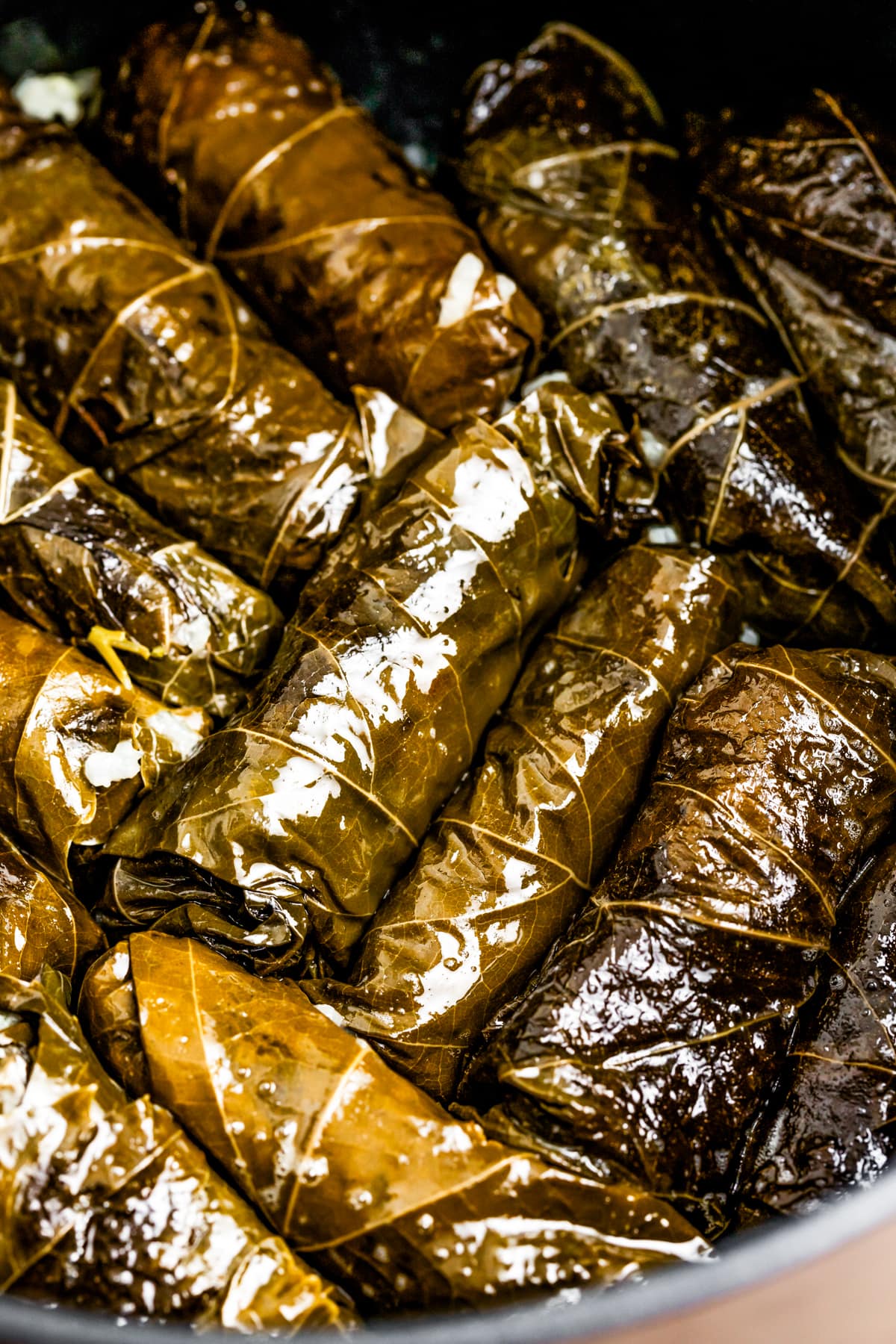
How To Serve Stuffed Grape Leaves
Vegetarian stuffed grape leaves such as these are traditionally served cold or at room temperature. However, those stuffed with a ground meat mixture are generally served warm. Stuffed grape leaves can be enjoyed as an appetizer, a tasty side dish, or a vegetarian entree.
- I love to serve them with my chicken over rice, grilled lemon chicken, or lamb chops paired with a Mediterranean classic such as my Mediterranean white bean salad or Jennifer Aniston’s bulgur salad. A Tabouli salad is also wonderful!
- My kids like to dip dolmas in this feta cheese and avocado hummus dip or this creamy artichoke dip.
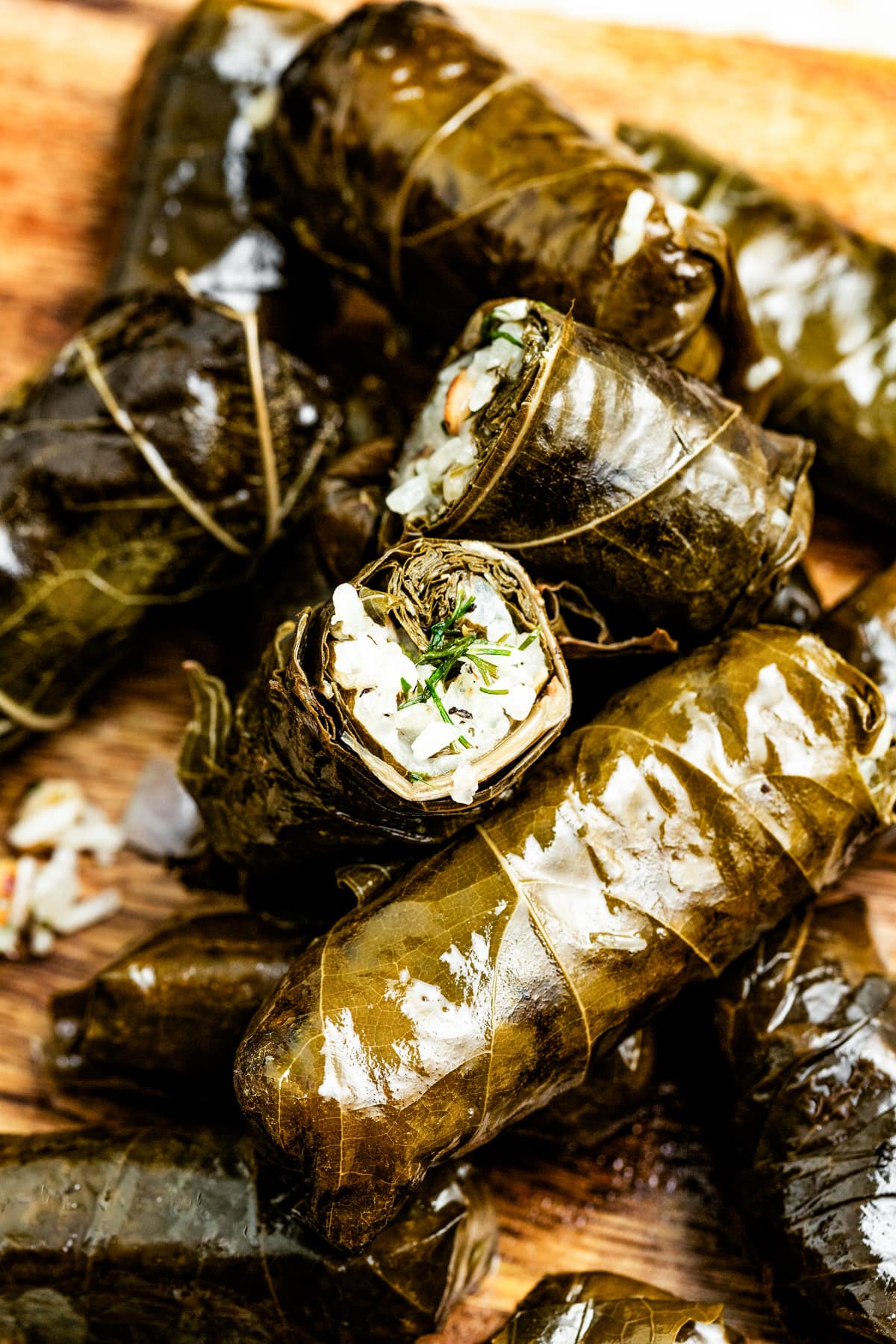
How to Store Leftovers
Let the leftover stuffed grape leaves cool down to room temperature. Put some olive oil in a zip-top bag or airtight container. Gently put the rolls in the container or bag. Close it and put it in the fridge for up to a week. You could also freeze them for up to 3 months. Let them thaw overnight in the refrigerator.
More Mediterranean Recipes
Pin this now to find it later
Pin It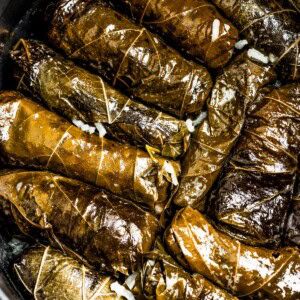
Stuffed Grape Leaves
Ingredients
- ½ cup long-grain rice
- 20 to 30 jarred grape leaves
- ¼ cup + 3 tablespoons olive oil, divided
- 1 small yellow onion, diced
- 2 cloves garlic, minced
- 2 tablespoons lemon juice
- 2 tablespoons chopped fresh dill
- 1 tablespoon chopped fresh parsley
- 2 tablespoons toasted pine nuts
- 1 teaspoon sea salt
- ½ teaspoon freshly ground black pepper
Instructions
To make the rice
- Soak the rice in warm water for 20 minutes.
- Drain the rice.
To prepare the grape leaves
- Rinse the grape leaves in a colander with cold water.
- Bring a pot of water to a boil.
- Drop the rinsed leaves in the boiling water and cook for 3 minutes or until softened.
- Drain the leaves in a colander and set aside to cool.
To make the filling
- In a large saucepan, heat 1 tablespoon of olive oil over medium-high heat.
- Add the onions and sauté until translucent, about 2 minutes.
- Add the garlic and sauté for 15 seconds or until fragrant. Remove the pan from the heat.
- Add the soaked, drained rice, lemon juices, 2 tablespoons of olive oil, fresh dill, parsley, toasted pine nuts, sea salt, and ground black pepper to the pan. Stir to combine.
To fill the grape leaves.
- Lay a grape leaf flat and place about 2 tablespoons of filling at the stem side of the leaf about ½ inch from the edge.
- Roll the stem side of the leaf over the filling.
- Pull the sides toward the center.
- Roll from the stem side over the folded sides and the filling until sealed. 1 done.
- Repeat with the remaining ingredients. You might have extra filling. If so, stuff any grape leaves you have left over or discard them.
To cook the stuffed grape leaves.
- Arrange the stuffed grape leaves in a large, heavy-bottomed pot. They should be arranged so that they are as close together as possible. This will keep them from falling apart during the cooking process.
- Pour ¼ cup of olive oil over them and enough water to just cover them.
- Place a large dinner plate over the stuffed grape leaves to keep them from floating.
- Bring the water to a boil before reducing it to a simmer.
- Cover and simmer for 30 to 45 minutes or until the water has been absorbed completely.
- Remove from the heat. Serve them warm or cold.
Equipment
Notes
- Use long-grained rice like Jasmine or Basmati.
- Jarred grape leaves are common and easy to use, but you can use fresh leaves. For fresh leaves, soak them in hot water for 15 minutes, drain, and dry before use. Also, it’s good to have a few extra leaves on hand as you might need to double up if you come across a grape leaf that is torn or slightly smaller.
- You can find grape leaves in grocery stores or online, typically in international, deli, or condiment sections.
- Handle grape leaves gently to avoid tearing. If they tear or are small, use an extra leaf.
- Pack stuffed grape leaves tightly in the pot to prevent them from opening.
- Vegetarian stuffed grape leaves are usually served cold or at room temperature, while those with meat are served warm.
- To store, let the stuffed grape leaves cool. Put some olive oil in a zip-top bag or airtight container. Gently put the grape leaves in the container or bag. Refrigerate for up to a week.
Nutrition
Nutritional info is an estimate and provided as courtesy. Values may vary according to the ingredients and tools used. Please use your preferred nutritional calculator for more detailed info.









I’ve been looking for a recipe for stuffed grape leaves. What a surprise for this to hit my email today. Do you also have a recipe for the ones with ground beef?
Hi!
Talk about perfect timing! 😁 While I don’t have a specific recipe for these with ground beef, you can easily modify steps #7, #8, and #9 in this recipe. In a large saucepan, heat 1 tablespoon of olive oil over medium-high heat. Add the onions and sauté until translucent. Add the garlic and sauté for 15 seconds. Then, add the ground beef and cook for about 6 minutes or until it’s completely browned, breaking it up with a wooden spoon as it cooks. Remove the pan from the heat and continue to follow the recipe from step #9 and on. Let me know if you have any other questions. P.S. I personally don’t like to use lemon juice when I make these with meat. 🙂